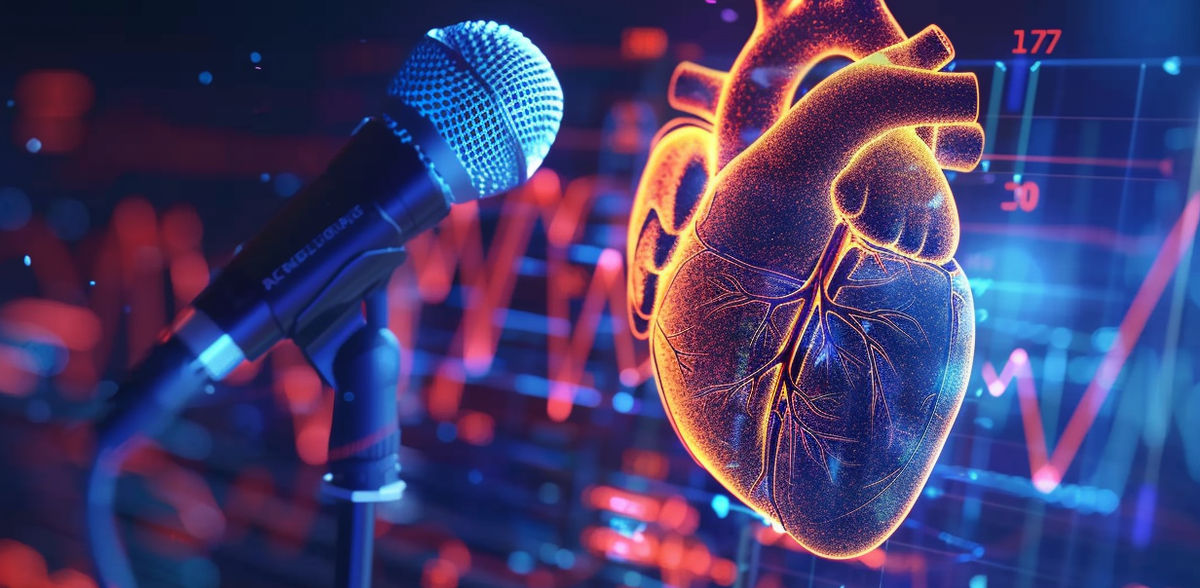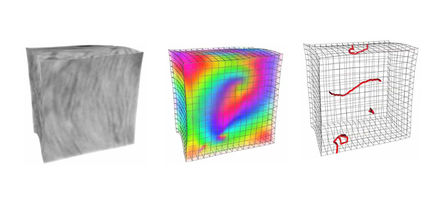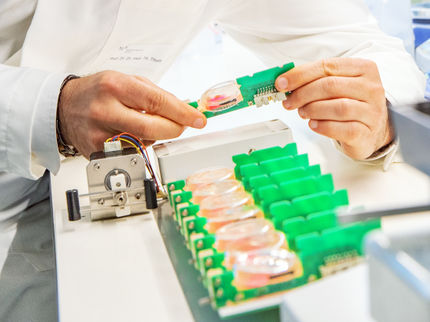Artificial intelligence recognizes heart disease by the sound of the voice
AI from a Berlin start-up is used for this purpose
Researchers at Charité's German heart Center and the Mayo Clinic in the USA are conducting a new study to find out how patients with advanced heart failure can be monitored telemedically using the sound of their voice. artificial intelligence from a Berlin start-up is being used for this.
"Once upon a time, the north wind and the sun were arguing about which of them was the stronger, when a wanderer, wrapped in a warm cloak, came along the path..." So begins a tale attributed to the ancient Greek poet Aesop. Horst S. from Berlin says it out loud into a microphone twice a day. However, not because he is enthusiastic about ancient fables - but because the sound of his voice is supposed to tell his doctors how his heart is doing.
The 88-year-old pensioner suffers from severe heart failure and is one of the first participants in a study that aims to provide scientists with new insights into the application and effectiveness of voice analysis using artificial intelligence in the treatment of chronic heart failure. It is being conducted at Charité's German Heart Center and the US Mayo Clinic under the title: "AI-Based Voice Analysis for Monitoring Patients Hospitalized with Acute Decompensated Heart Failure", or "VAMP-HF" for short.
Artificial intelligence for close monitoring of heart disease
In the first phase of the study, 25 patients suffering from advanced heart failure with "hydropic decompensation" will be included in each of the cardiology wards: Due to the severely reduced pumping function of the heart, not enough fluid can be transported from the tissue to the excretory organs, leading to fluid accumulation in the body and, as a result, to a further, often life-threatening deterioration in the general condition of the affected patients - particularly due to water in the lungs.
In addition to medication to strengthen the heart, the treatment of hydropic decompensation also includes diuretics, i.e. medication to improve the excretion of fluid. Cardiologists now need to closely monitor the effectiveness of the therapy and adjust it as quickly as possible if the desired results are not achieved.
The human voice could play an important role "as an early warning system" in the future, says PD Dr. Felix Hohendanner, senior physician at Charité's German Heart Center and clinical director of the VAMP-HF study, because: "More fluid in the body leads to a change in the propagation of sound waves and thus also to a change in the voice, which is usually not audible to the human ear but can still be measured."
Artificial intelligence predicts treatment success
Software from the Berlin start-up Noah Labs, which specializes in the development and application of artificial intelligence (AI) in the voice-based diagnosis of heart disease and has entered into a strategic partnership with the German Heart Institute Berlin Foundation, will be used.
The Noah Labs AI analyzes hundreds of parameters in the test subjects' voice samples and detects even the smallest changes. In comparison with the amount of fluid excreted by the heart failure patients, the AI now "learns" to predict the effectiveness of the treatment - so that doctors can take countermeasures even before symptoms occur.
Uncomplicated and safe to perform
In comparison to some other measurement methods, voice testing has many advantages for independent performance at home, says Felix Hohendanner: "It is painless, quick and uncomplicated, has hardly any sources of error and requires no technical aids other than a recording device such as a smartphone." In future, voice samples will even be transmitted with a simple phone call.
In addition, the method of AI-based telemedical voice evaluation can also be used for various other cardiovascular diseases, says the cardiologist: "We are only at the beginning of a promising development here."
Note: This article has been translated using a computer system without human intervention. LUMITOS offers these automatic translations to present a wider range of current news. Since this article has been translated with automatic translation, it is possible that it contains errors in vocabulary, syntax or grammar. The original article in German can be found here.
Something is happening in the life science industry ...
This is what true pioneering spirit looks like: Plenty of innovative start-ups are bringing fresh ideas, lifeblood and entrepreneurial spirit to change tomorrow's world for the better. Immerse yourself in the world of these young companies and take the opportunity to get in touch with the founders.
See the theme worlds for related content
Topic world Diagnostics
Diagnostics is at the heart of modern medicine and forms a crucial interface between research and patient care in the biotech and pharmaceutical industries. It not only enables early detection and monitoring of disease, but also plays a central role in individualized medicine by enabling targeted therapies based on an individual's genetic and molecular signature.

Topic world Diagnostics
Diagnostics is at the heart of modern medicine and forms a crucial interface between research and patient care in the biotech and pharmaceutical industries. It not only enables early detection and monitoring of disease, but also plays a central role in individualized medicine by enabling targeted therapies based on an individual's genetic and molecular signature.
























































